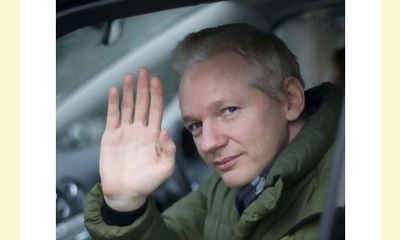|
|
WikiLeaks: The Latin America Files
un articulo por Peter Kornbluh in The Nation (reprinted by permission)
Video: Julian Assange talks to TED
On June 19, WikiLeaks founder Julian Assange slipped into the Ecuadorean Embassy in London, seeking sanctuary and asylum from extradition to Sweden for questioning on alleged sexual misconduct. If and when the government of Rafael Correa grants his request — a decision that had yet to be made as The Nation went to press — Assange will become a resident of Latin America, where the trove of US State Department cables he strategically disseminated has generated hundreds of headlines, from Mexico to the Southern Cone.

Julian Assange (Carl Court, AFP Photo)
click on photo to enlarge
“Cablegate,” as the revelations have come to be known, has had a different degree of impact in each Latin American nation—on politics, the media, and the public debate over transparency and government accountability. In two countries it led to the forced departure of the US ambassador; in another it helped change the course of a presidential election. In some countries, the documents revealed the level of US influence in domestic affairs; in others they detailed criminal activities and corruption within a number of host governments. In many nations, the cables disclosed the parade of local political, cultural and even media elites who lined up to divulge information—or gossip—to US Embassy officers, never suspecting that their discussions would become front-page news.
Collectively, the Americas have been treated to a mega– civics lesson in globalized whistleblowing. And US citizens have also peered into the foreign policy abyss of our bilateral and regional ties. A year after the diplomatic dust has settled on the WikiLeaks phenomenon in Latin America, it seems appropriate to assess—drawing attention to the experiences of Brazil, Mexico and Colombia—what the biggest leak of US documents in history has left in its wake.
Although Assange initially gave the cables to four major European news outlets, he always intended to distribute the documents beyond the media organs of the North. Latin America was the perfect region to make a splash with the leaks. Historically, the “Colossus of the North” has exercised an imperious — if not imperial — economic, military and political influence in its “backyard.” This interventionist past created a nationalist appetite for revelations on the hidden truths of US policies and operations.
The decade covered by most of the cables—2000 to 2010—also encompassed major changes in the region and in US–Latin American relations: the rise of Hugo Chávez in Venezuela and the resurgence of the populist left; the advent of “Plan Colombia”; Brazil’s emergence as a world power; the disputed 2006 election in Mexico; the transfer of power from Fidel to Raúl Castro in Cuba; and the June 2009 coup in Honduras. Moreover, a growing number of nations passed freedom of information laws, reflecting a popular interest in access to government documents and an expanding right-to-know movement that Assange hoped to advance. As he explained in an interview with Semana in Bogotá, WikiLeaks is an “organization opposed to government abuse of secrecy.”
(This article is continued in the discussionboard)
|








|
DISCUSSION
Pregunta(s) relacionada(s) al artículo :
Julian Assange, Is he a hero for the culture of peace?
* * * * *
Comentario más reciente:
:
In my previous post on this subject (see above), I provided a link to a television program by Democracy Now with Amy Goodman on the question of whether Julian Assange is a culture of peace hero.
Now, a month later, there is a new television interiew by Democracy Now with Amy Goodman who speaks with an attorney who is a legal adviser to Julian Assange in the United States. Here is the introduction by Democracy Now of the contents to the interview: "Documents obtained under the Freedom of Information Act show WikiLeaks founder Julian Assange may have been designated an "enemy of the state" by the United States. U.S. Air Force counterintelligence documents show military personnel who contact WikiLeaks or its supporters may be at risk of being charged with "communicating with the enemy" — a military crime that carries a maximum sentence of death. We speak to attorney Michael Ratner, president emeritus of the Center for Constitutional Rights and a legal adviser to Assange and WikiLeaks."
Is it not possible to interpret this to mean that the State has come to monopolize the culture of war and those who work for a culture of peace are therefore seen by the State as "enemies"?
(Note added in May 2013: For more update on the status of Julian Assange, along with an assessment of the importance of his work, see the interview "The Death of Truth" by Chris Hedges in Truthdig.)

|
|









